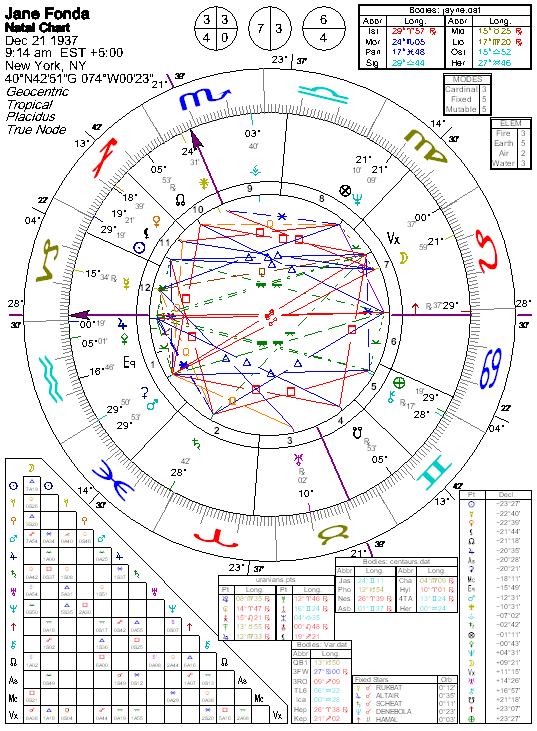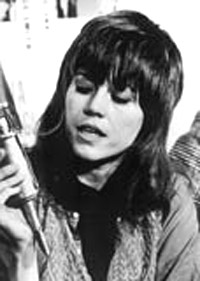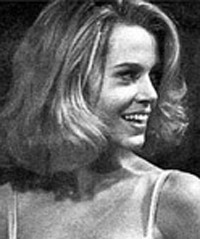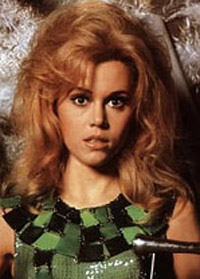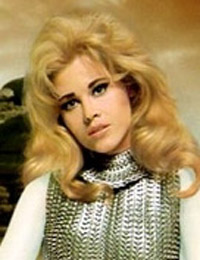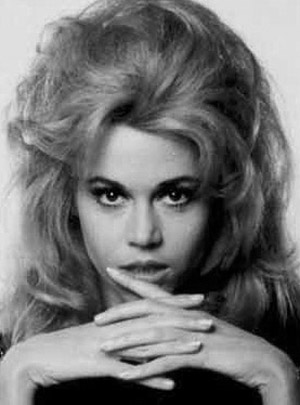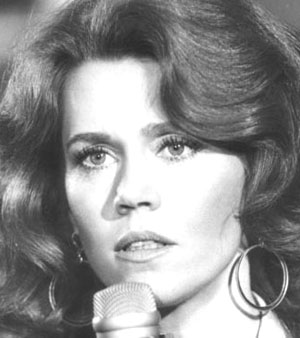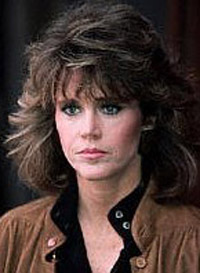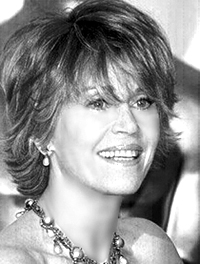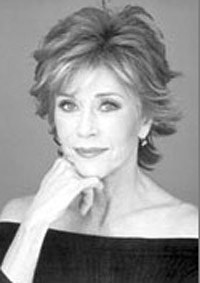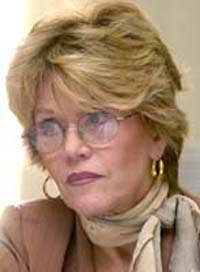Jane Fonda
Copyright Michael D. Robbins 2005
Astro-Rayological
Interpretation & Charts
Quotes
Biography
Iimages and Physiognomic Interpretations
Jane Fonda—Actress, Fitness Guru, Political Activist
December 21, 1937, New York, New York, 9:14 AM, EST. (Source: recorded) Another time is given personally—7:57 PM, EST. These result in very different horoscopes.
(Either Capricorn or Leo rising; Sun and Venus in Sagittarius; Mercury retrograde in the last degrees of Capricorn; Mars in the last degrees of Aquarius and Jupiter in the first degree; Saturn in the last degrees of Pisces; Uranus in Taurus; Neptune in Virgo; Pluto in Leo on the DC of the Capricorn rising chart) The Capricorn rising chart has the advantage of indicating the fateful and political nature of her long-term partnerships—first to Tom Hayden and then to Ted Turner—through Pluto at the seventh house cusp and Juno—the asteroid of serious partnerships in Scorpio—on the MC.
Jane Fonda's name has always been synonymous with idealism and the fervent support of causes—whether or not one believed in the wisdom of such causes. Her love of politics is indicated by her Capricorn Ascendant, and the progressive nature of her views, by her Aquarian planets as well as by the Sagittarian energy expressed through her Sun (sixth ray). Her idealism (sixth ray) is accentuated by sixth ray Mars in the idealistic sign Aquarius. Her role as a dominant and noticeable individual, in whatever she undertakes, is impulsed by her Leo Moon. Venus in Sagittarius has contribute to her role as ‘Queen of Fitness’, showing the way to beauty (Venus) through exercise (Sagittarius).
It is clear that she has strong political aspirations, expressed to some degree through her partnership with powerful political or business figures. She possesses a ready Aquarian idealism, accented by progressive Jupiter in Aquarius rising. (Complete this)
The number of planets in the late degrees of the signs indicate that Jane Fonda is bringing to a conclusion a number of important impulses—very late Capricorn rising; the Sun is in the last degree of Sagittarius; Mars is in the last degree of Aquarius; and Saturn is in the next to the last degree of Pisces.
Fonda has forcefully played out different aspects of her personality each decade: in the Sixties, she was a sex kitten in her husband's movies; the Seventies saw her praised and reviled for her political stand and visit to Hanoi; during the Eighties she was at the forefront of the exercise boom; and the Nineties have seen her move into the role of wife to billionaire and tycoon Ted Turner (qv). She had a tense relationship with her father, and her mother committed suicide when Jane was a teenager. She played out many issues with father Henry Fonda (b. 16 May 1905, Grand Island, Nebraska, 40N56, 98W21, news birth announcement obtained by Edwin Steinbrecher gives 'afternoon') in the Oscar-winning film 'On Golden Pond' in November 1981. Her actor-brother is Peter Fonda (b. 23 February 1940, 12.09 pm EST, Manhattan, New York, 40N46, 73W59, from Birth Certificate, AA). Her niece is the talented film actress Bridget Fonda (b. 27 January 1964, 3.45 am PST, Los Angeles, California, 34N03, 118W15, from Birth Certificate, AA).
"Working in Hollywood does give one a certain expertise in the field of prostitution."
"I was terrified when I turned 30. I was pregnant and had the mumps and Faye Dunaway was just coming out in Bonnie and Clyde (1967). I thought, 'Oh my God, I'll never work again. I'm old!'"
"Acting with [Laurence] Harvey is like acting by yourself - only worse." - Jane Fonda on her 1962 film Walk on the Wild Side
"It hurt so many soldiers. It galvanised such hostility. It was the most horrible thing I could possibly have done. It was just thoughtless." [expressing regret at her support for the Viet Cong]
"I, a Socialist, think we should strive toward a Socialist society, all the way to Communism."
"If you understood what Communism was, you would hope, you would pray on your knees that one day we would become Communist." (speaking to students at the University of Michigan in 1970)
"People think actresses find public speaking easy, and it's not easy at all; we're used to hiding behind masks."
[accepting her father's Oscar for On Golden Pond]: "I'll bet when he heard it just now he said 'Hey ain't I lucky?' As if luck had anything to do with it."
"The image of Jane Fonda, Barbarella, Henry Fonda's daughter ... sitting on an enemy aircraft gun (in North Vietnam) was a betrayal...The largest lapse of judgment that I can even imagine."
"I would have given up acting in a minute. I didn't like how it set me apart from other people."
"When I start down a path that I know is the right path, I go with all of me."
"I'm a very brave person. I can go to North Vietnam, I can challenge my government, but I can't challenge the man I'm with if means I'm going to end up alone."
"It's hard to imagine a happy ending to the US-led war in Iraq. What's it going to mean for stability as a nation, for terrorism, for the economy I can't imagine. I think the entire world is going to be united against us."
Ted [Turner] needs someone to be there 100 percent of the time. He thinks that's love. It's not love. It's babysitting.
"I wanted to do a tour like I did during the Vietnam War, a tour of the country. But then Cindy Sheehan filled in the gap, and she is better at this than I am. I carry too much baggage."
A good many dramatic situations begin with screaming.
A man has every season while a woman only has the right to spring.
But the whole point of liberation is that you get out. Restructure your life. Act by yourself.
I don't know if a country where the people are so ignorant of reality and of history, if you can call that a free world.
I'm an assistant storyteller. It's like being a waiter or a gas-station attendant, but I'm waiting on six million people a week, if I'm lucky.
If the career you have chosen has some unexpected inconvenience, console yourself by reflecting that no career is without them.
It is extraordinary how the house and the simplest possessions of someone who has been left become so quickly sordid. Even the stain on the coffee cup seems not coffee but the physical manifestation of one's inner stain, the fatal blot that from the beginning had marked one for ultimate aloneness.
My husband said he wanted to have a relationship with a redhead, so I dyed my hair.
Ted needs someone to be there 100% of the time. He thinks that's love. It's not love - it's babysitting.
Telling lies and showing off to get attention are mistakes I made that I don't want my kids to make.
(Leo Moon)
The image of Jan Fonda, Barbarella, Henry Fonda's daughter... siting on an enemy aircraft gun was a betrayal... the largest lapse of judgment that I can even imagine.
There are only three ages for women in Hollywood-Babe, District Attorney, and Driving Miss Daisy.
To be a revolutionary you have to be a human being. You have to care about people who have no power.
(Pluto in Cancer conjunct Descendant)
We cannot always control our thoughts, but we can control our words, and repetition impresses the subconscious, and we are then master of the situation.
(Mercury in Capricorn)
When you can't remember why you're hurt, that's when you're healed.
It's never too late - never too late to start over, never too late to be happy.
Every woman should eat for the long run so she can manage the short stops of crisis.
You can do one of two things; just shut up, which is something I don't find easy, or learn an awful lot very fast which is what I tried to do.
(Sun in Sagittarius)
“If you're ever in a situation where you're not getting served or you can't get what you need, just cry”
“If you don’t have a parent or an adult, a teacher or a mentor … really see you, really love you, 'Yes, there are things you do I don’t like, but you’re fantastic, you’re good enough. I love you.' If that never happens to a child, the child assumes it’s her fault and tries to compensate for it,”
“The script came along and it was funny and it gave me the chance to play an outrageous character and I've never done anything before quite like her,”
“I'm proud I went to North Vietnam because Nixon was lying to us,”
“I wish that I’d been able to have a class like this when I had my first kid, 'cause I was not a good mother, ... And then, you end up paying for it later.”
“Contraception is important. Making contraception available doesn't lead to promiscuity. But much more is needed than just contraception.”
“I don't want my wrinkles taken away - I don't want to look like everyone else.”
“In my mind it takes a special kind of courage to risk your life in another country, for your own country. The men and women who came back and spoke out were a special kind of hero.”
“My mother killed herself when I was 12. I won't complete that relationship. But I can try to understand her.”
“Just watching Bette Davis on the screen was empowering to women, I think. Certainly was to me. It was like: This is what's possible. This is the range and depth that is possible for a woman.”
“I thank God and I thank Ted Turner (her estranged husband) everyday that I don't have to make movies.”
"I have said many times that I am a feminist, but I didn't embody it because I felt the need to please men. Earlier I was a feminist in my head, but now I am feminist embodied throughout."
- Jane Fonda, March 9, 2004, speaking before performing in a production of the play at Bombay's posh Tata theatre, timed to coincide with International Women's Day (Vagina Monologues, V-Day), in entertainment.iafra.com.
"It is limiting, to neglect to link up the war with the women's movement." - Jane Fonda
"You can't talk about vaginas, and not talk about this remarkable ability that they have, to give birth. It is awesome. If penises could do, what vaginas could do, they'd be on postage stamps. There would be a 12-foot one embronzed at the rotunda in Washington. I mean, vaginas are just absolutely extraordinary. It's the most important part of our lives" -Jane Fonda, to Barbara Walters, Feb. 9, 2001.
"I am so moved by the women who have forfeited Penis Privilege for Vagina Power. It's certainly the road less traveled but it's the road of courage and you are not alone. - - Love, Jane" - Jane Fonda's V-Day LA 2004 Statement
(Venus in Sagittarius in 11th house)
"Nixon's worried about being the first president to lose a war. He might be the first president to lose his army." - Jane Fonda, 1970, The Chimes of Freedom Flashing: A Personal History of the Vietnam Anti-war Movement and the 1960s, Chapter 3 THE MOBE: HIGH NOON FOR THE ANTI-WAR MOVEMENT, by Caleb S. Rossiter.
"'I want to speak on your radio,' I say to my hosts. 'I want to try to tell U.S. pilots what I am seeing here on the ground.'" - Jane Fonda requesting the North Vietnamese communists allow her to make propaganda speeches on Radio Hanoi, July 1972, in "My Life So Far" (page 304).
This is Jane Fonda. During my two week visit in the Democratic Republic of Vietnam, I've had the opportunity to visit a great many places and speak to a large number of people from all walks of life--workers, peasants, students, artists and dancers, historians, journalists, film actresses, soldiers, militia girls, members of the women's union, writers." - Jane Fonda on Radio Hanoi, July 1972, in JANE FONDA IN NORTH VIETNAM.
"Those letters formed a popular acronym among GIs (Fuck the Army), but for us (publicly at least), it meant Free the Army. Howard wanted us to try to bring the show to U.S. military bases both stateside and in the Pacific. I found the concept irresistible. Here was a way to support the GI movement — which I increasingly felt was the cutting edge of the peace movement — and to do so using my professional skills. Acting and activism — together at last." - Jane Fonda in "My Life So Far" (page 272).
"The image of Jane Fonda, Barbarella, Henry Fonda's daughter...sitting on an enemy aircraft gun was a betrayal...It was the largest lapse of judgment that I can even imagine." - Jane Fonda, interviewed by Leslie Stahl, on CBS 60 Minutes television April 3, 2005.
"I will go to my grave regretting the photograph of me in an anti-aircraft carrier, which looks like I was trying to shoot at American planes". - Jane Fonda to Oprah Winfrey. See larger photo - - Jane Fonda Gallery
"I have a whole solar house in New Mexico with electricity and hot water coming from the sun. We could save, through conservation and alternative sources enough energy that we'd never need to drill (for oil) in Alaska. . . .Put it this way, I haven't lost my caring about what's happening to this planet. It makes me mad to see this guy standing up there saying we're not ready. We were ready 20 years ago (for alternatives). The oil company lobbies are just too big!" - Jane Fonda, upset with Vice President Dick Cheney wanting more nuclear power, in USAToday, Sept. 3, 2001
"I would think that if you understood what communism was you would hope, you would pray on your knees, that we would someday become communists." - Jane Fonda, at Michigan State University, d in Detroit Free Press of November 22, 1970.
"My becoming a Christian upset him very much - for good reason. He’s my husband and I chose not to discuss it with him because he would have talked me out of it. He’s a debating champion. He saw it as writing on the wall." - Jane Fonda
"I have said many times that I am a feminist, but I didn't embody it because I felt the need to please men. Earlier I was a feminist in my head, but now I am feminist embodied throughout." - Jane Fonda, March 9, 2004, speaking before performing in a production of the play at Bombay's posh Tata theatre, timed to coincide with International Women's Day (Vagina Monologues, V-Day), in entertainment.iafra.com.
"I was born on the shortest day—winter solstice (Dec. 21, 1937). It makes me feel connected by some primordial energy to Stonehenge and Machu Picchu, where the solstice was celebrated and revered by the Celts and Incas." - Jane Fonda, "My Life So Far" (page 40).
"There have been plenty of people who accused me of romanticizing the Vietnamese. Well, yes. They were easy to romanticize during the war, as they battled the mighty U.S. military power. The David and Goliath legend hasn't survived the centuries for nothing. Do you know anyone who roots for Goliath (except maybe those who want something from him)? It's the Davids who touch our hearts." - Jane Fonda, "My Life So Far" (page 357).
(Mars in Aquarius)
"On the night I turned fifty-one (Dec. 21, 1988) Tom announced to me that he was in love with another woman... I don't think Tom expected it to be the end. I think he believed, as did others, that I had known all along of his infidelities and didn't really mind." - Jane Fonda, "My Life So Far" (page 462-463).
Birth name Lady Jayne Seymour Fonda[1]
Born December 21, 1937 (age 68)
New York City, New York (born December 21, 1937) is an American actress, writer, political activist, former fashion model, and fitness guru.
Since the 1960s Fonda has appeared in movies, many of which have contained political messages. She has won two Academy Awards and received several other awards and nominations. She initially announced her retirement from acting in 1991, and said for many years that she would never act again, but she returned to film in 2005 with Monster in Law. She also produced and starred in several exercise videos released between 1982 and 1995.
Fonda has served as an activist for various political causes, one of the most notable of which was her opposition to the Vietnam War. She has also protested the Iraq War and violence against women. She describes herself as a liberal and a feminist.
Since 2001, Fonda has considered herself a Christian. She published an autobiography in 2005 and currently lives in Atlanta, Georgia.
Ancestry and family
was born in New York City to actor Henry Fonda and socialite Frances Ford Seymour, and named Lady Jayne Seymour Fonda. When Jane was twelve years old, her mother committed suicide after voluntarily seeking treatment at a psychiatric hospital.[2]
Henry Fonda had distant Dutch ancestry, and the surname Fonda originates from Holland.[3] The "Lady" part of Jane Fonda's name was apparently inspired by Lady Jane Seymour, the third wife of King Henry VIII of England, who she is distantly related to on her mother's side. The "Jayne" comes from her father's middle name Jaynes.
Her brother, Peter Fonda (born 1939), and his daughter Bridget Fonda (born 1964), are also actors. She has an older half-sister, Frances Brokaw, as well as an adopted sister, Amy, who was born in 1953.[4]
After Seymour's suicide, Henry Fonda married Susan Blanchard, who was only 10 years older than Jane. Although all of Henry's children seemed to like Blanchard, Blanchard and Henry Fonda divorced before Jane turned 20.[5]
Acting career
Before starting her acting career, Fonda was a fashion model, gracing the cover of Vogue magazine twice. [3]Fonda became interested in acting in 1954, while appearing with her father in a charity performance of The Country Girl, at the Omaha Community Theatre. After attending Vassar College in New York, she was introduced by her father to renowned drama teacher Lee Strasberg in 1958, and subsequently joined his Actors Studio.
1960s
Fonda in 1968's Barbarella, the role that made her into an universal sex symbolHer stage work in the late 1950s laid the foundation for her film career in the 1960s. She averaged almost two movies a year throughout the decade, starting in 1960 with Tall Story, in which she recreated one of her Broadway roles as a college cheerleader pursuing a basketball star, played by Anthony Perkins. Period of Adjustment and Walk on the Wild Side followed in 1962. In Walk on the Wild Side, Fonda played a prostitute, and earned a Golden Globe for Most Promising Newcomer.
In 1963, she appeared in Sunday in New York. Newsday called her "the loveliest and most gifted of all our new young actresses". However, she also had her detractors—in the same year, the Harvard Lampoon named her the "Year's Worst Actress". Fonda's career breakthrough came with Cat Ballou (1965), in which she played a schoolmarm turned outlaw. This comedy Western received five Oscar nominations and was one of the year's top ten films at the box office. It was considered by many to have been the film that brought Fonda to stardom at the age of twenty-eight. After this came the comedies Any Wednesday (1966) and Barefoot in the Park (1967), the latter co-starring Robert Redford.
In 1968, she played the lead role in the science fiction spoof Barbarella, which established her status as a sex symbol. In contrast, the tragedy They Shoot Horses, Don't They? (1969) won her critical acclaim, and she earned her first Oscar nomination for the role. Fonda was very selective by the end of the 1960s, turning down lead roles in Rosemary's Baby and Bonnie and Clyde, films widely praised by critics and considered box-office successes.
1970s
in KluteFonda won her first Academy Award for Best Actress in 1971, again playing a prostitute, the gamine Bree Daniel, in the detective murder mystery Klute. It is generally acknowledged that her finest moment onscreen is the extraordinary scene towards the end of Klute where she is confronted by her potential killer. Her second Award was in 1978 for Coming Home, the story of a disabled Vietnam War veteran's difficulty in re-entering civilian life.
Between Klute in 1971 and Fun With Dick and Jane in 1977, Fonda spent most of the first half of the decade without a major film success, even though she appeared in films such as A Doll's House (1973) and The Blue Bird (1976). From comments ascribed to her in interviews, some have inferred that she personally blamed the situation on anger at her outspoken political views - "I can't say I was blacklisted, but I was greylisted."[6] However in her 2005 autobiography, My Life So Far it would appear that she categorically rejects such simplification. "The suggestion is that because of my actions against the war my career had been destroyed ... But the truth is that my career, far from being destroyed after the war, flourished with a vigor it had not previously enjoyed."[7] From her own point of view it would appear that her absence from the silver screen was related more to the fact that her political activism provided a new focus in her life. By the same token her return to acting with a series of 'issue-driven' films was a reflection of this new focus. "When I hear admonitions ... warning outspoken actors to remember 'what happened to Jane Fonda back in the seventies', this has me scratching my head: And that what would be...?"
Through her production company, IPC Films, she produced films that helped return her to star status. The 1977 comedy film Fun With Dick and Jane is generally considered her "comeback" picture. She also received very positive reviews and an Oscar nomination for her portrayal of playwright Lillian Hellman in the 1977 film, Julia. During this period Fonda announced that she would make films only that focused on important issues, and she generally stuck to her word. She turned down An Unmarried Woman because she felt the part was not relevant. She followed with popular and successful films such as The China Syndrome (1979), about a coverup of an accident in a nuclear power plant; and The Electric Horseman (1979) with her previous co-star, Robert Redford.
1980s
In 1980, Fonda starred in the office-politics comedy Nine to Five with Lily Tomlin and Dolly Parton. Her character was re-entering the workforce, after a divorce had devastated both her finances and self-confidence. The film was one of Fonda's greatest financial successes, contributing significantly to her wealth.
She had long wanted to work with her father, hoping it would help their strained relationship. She achieved this goal when she was cast as a supporting actress alongside Henry Fonda and Katharine Hepburn in On Golden Pond (1981). This film brought Henry Fonda his first Academy Award for Best Actor, which Jane accepted on his behalf, as he was ill and home bound. He died five months later.
Fonda continued appearing in feature films throughout the 1980s, most notably her role of Dr. Martha Livingston in Agnes of God.
Exercise videos
For many years, Fonda was a ballet enthusiast, but after fracturing her foot while filming The China Syndrome, she was no longer able to participate. To compensate, she began actively participating in aerobics and strengthening exercises. This became a second career for her, which continued for many years.
In 1982, Fonda released her first exercise video, titled Jane Fonda's Workout, which sold 17 million copies, the most of any home video ever. The video's release led many people to buy the then-new VCR, in order to watch and perform the workout in the privacy and convenience of their own homes. Fonda subsequently released 23 more workout videos, five workout books, and thirteen audio tapes. Her most recent original workout video was released in 1995.
Retirement and return
In April 1991, after three decades in film, Fonda announced her retirement from the film industry. In May 2005, however, she returned to the screen, after a fourteen-year absence, with the box-office success Monster-in-Law, a comedy in which she played the manipulative prospective mother-in-law of Jennifer Lopez's character .
In July 2005, the British tabloid The Sun reported that when Fonda was asked if she would appear in a sequel to her 1980 hit Nine to Five, she replied "I'd love to."[8]
Fonda's next project is the Garry Marshall-directed, Georgia Rule, which began shooting in July 2006. Fonda stars along with Felicity Huffman, and Lindsay Lohan.
In the course of her career, Fonda has received seven Oscar nominations, winning twice.
Political activism
On orders from Washington DC, customs officials arrested Fonda on November 3, 1970 at the Cleveland airport for disturbing the peace, and charged her with “smuggling unidentified pills.” All charges were dropped when the "pills" turned out to be vitamins.During the 1960s, Fonda engaged in political activism in support of the Civil Rights Movement and in opposition to the Vietnam War.
Along with other celebrities, she supported the Alcatraz Island occupation in 1969, which was intended to call attention to Native American issues. (In the 1990s, she was criticized by Native American activists for making the perceived racist, sports-fan celebration gesture, "The Tomahawk Chop", at Atlanta Braves baseball games with her then-husband Ted Turner.)
She likewise supported Huey Newton and the Black Panthers in the early 1970s, stating "Revolution is an act of love; we are the children of revolution, born to be rebels. It runs in our blood." She called the Black Panthers "our revolutionary vanguard", and said "we must support them with love, money, propaganda and risk." In a 1979 appearance at the National Press Club in Washington, DC, she was asked about her past praise for Huey Newton and won laughter and applause for her response: "I've said a lot of off-the-wall things in my life. All I can say about that is I was naive and utterly wrong."
Fonda has also been involved in the feminist movement since the 1970s, which dovetails with her activism in support of civil rights.
Opposition to the Vietnam War
Main article: Opposition to the Vietnam War
In April 1970, Fred Gardner, Fonda and Donald Sutherland formed the FTA tour ("Free The Army", a play on the troop expression "Fuck The Army"), an anti-war road show designed as an answer to Bob Hope's USO tour. The tour, referred to as "political vaudeville" by Fonda, visited military towns along the West Coast, with the goal of establishing a dialogue with soldiers about their upcoming deployments to Vietnam. The dialogue was made into a movie (F.T.A.) that contained strong, frank criticism of the war by service men and women. It was released in 1972.[9]
In the same year, Fonda spoke out against the war at a rally organized by Vietnam Veterans Against the War (VVAW) in Valley Forge, Pennsylvania. She offered to help raise funds for VVAW, and, for her efforts, was rewarded with the title of Honorary National Coordinator.[10] On November 3, 1970, Fonda started a tour of college campuses on which she raised funds for the organization. As noted by the New York Times, Fonda was a "major patron" of the VVAW.
In March 1971, Fonda traveled to Paris to meet with National Liberation Front (NLF) foreign minister Madam Nguyen Thi Binh. According to a transcript that was translated into Vietnamese and back to English, Fonda told Binh at one point: "Many of us have seen evidence proving the Nixon administration has escalated the war, causing death and destruction, perhaps as serious as the bombing of Hiroshima." Afterwards, Fonda traveled to London, where she again came under fire for making a speech that discussed the use of torture by US troops in Vietnam. Her financial support to VVAW at this time was apparently not significant, as the organization ran out of money within a month, and one of its prominent leaders, John Kerry, was called upon to raise the necessary funds.
"Hanoi Jane"
on the NVA anti-aircraft gunFonda visited Hanoi in July 1972. She is credited with publicly exposing Richard Nixon's potential strategy of bombing the dikes in Vietnam. At the time, she was called a liar by United Nations ambassador George H. W. Bush. Bush was intending to provide evidence of US innocence, but cancelled the press conference after Fonda released filmed evidence, with Bush saying, "I think that the best thing I can do on the subject is to shut up." In 2004, her former husband Tom Hayden renewed claims that "Fonda was right and Bush was lying".[11]
In Vietnam, Fonda was photographed seated on an anti-aircraft battery used against American aircrews.[12] She also participated in several radio broadcasts on behalf of the Communist regime, asking US aircrews to consider the consequences of their actions. In her 2005 autobiography, she states that she was manipulated into sitting on the battery, and claims to have been immediately horrified at the implications of the pictures. Fonda says that it was not what was in her heart at all, and wasn't the reason why she was even there. She was there to film evidence of the Nixon Administration's plan to blow up the dikes, (a plan that Fonda says "Johnson, to his credit decided not to do"), and the lie the administration had been giving to the public, that troop returns were imminent. She expressed regret for her actions many times over the years, but some Americans remain hostile to her. "I've learned that a picture does not capture what was actually in your heart."
During this visit she also visited American prisoners of war (POWs); and brought back messages from them to their families. When cases of torture began to emerge among POWs returning to the United States, Fonda called the returning POWs "hypocrites and liars".[13] She added, "These were not men who had been tortured. These were not men who had been starved. These were not men who had been brainwashed." On the subject of torture in general, Fonda told the New York Times in 1973, "I'm quite sure that there were incidents of torture... but the pilots who were saying it was the policy of the Vietnamese and that it was systematic, I believe that's a lie." Several American POWs and other eyewitnesses, including former POW and current US Senator John McCain, disagree with this sentiment.
The POW camp visits also lead to persistent stories - widely circulated on the Internet and via email - that the POWs she met had reviled her or attempted to sneak notes to her, which she had reported to the North Vietnamese, leading to further abuse. These false accounts have been discredited by the former prisoners who are directly mentioned in the accounts.
Although Fonda's actions in July 1972 did not receive widespread coverage at the time (The New York Times, for example, ran only a brief UPI story and no photograph), her trip was perceived by many as an unpatriotic display of aid and comfort to the enemy, with some characterizing it as treason; the Nixon Administration, however, dismissed calls for legal action against her. Years later, she was labeled as Hanoi Jane by her critics and compared to war propagandists Tokyo Rose and Hanoi Hannah. (The first recorded use of the phrase is in a 1979 Washington Post article, citing picket signs by KKK and American Nazi demonstrators, not Vietnam veterans, at a Fonda speech.) She has often been accused of contributing to a perceived anti-soldier sentiment (despite the fact that she got involved in the anti-war movement by working with active-duty anti-war soldiers and veterans). Because of her actions, actor John Wayne cut off all contact with her, despite his close ties to her father.
In 1972, Fonda funded and organized the Indochina Peace Campaign.[14] It continued to mobilize antiwar activists across the nation after the 1973 Paris Peace Agreement, when most other antiwar organizations closed down.
Fonda's regrets
In 1988, Fonda admitted to former American POWs and their families that she had some regrets, stating:
"I would like to say something, not just to Vietnam veterans in New England, but to men who were in Vietnam, who I hurt, or whose pain I caused to deepen because of things that I said or did. I was trying to help end the killing and the war, but there were times when I was thoughtless and careless about it and I'm very sorry that I hurt them. And I want to apologize to them and their families. [...] I will go to my grave regretting the photograph of me in an anti-aircraft gun, which looks like I was trying to shoot at American planes. It hurt so many soldiers. It galvanized such hostility. It was the most horrible thing I could possibly have done. It was just thoughtless."
On the Charlie Rose program, Fonda noted that her regrets were limited to the photo appearance with the anti-aircraft gun, and that she was "proud" of her activism against "the bombing of the dikes".
In a 60 Minutes interview on March 31, 2005, Fonda reiterated that she had no regrets about her trip to North Vietnam in 1972, with the exception of the anti-aircraft gun photo. She stated that the incident was a "betrayal" of American forces and of the "country that gave me privilege". Fonda said, "The image of Jane Fonda, Barbarella, Henry Fonda's daughter ... sitting on an enemy aircraft gun was a betrayal ... the largest lapse of judgment that I can even imagine." She later distinguished between regret over the use of her image as propaganda and pride for her anti-war activism: "There are hundreds of American delegations that had met with the POWs. Both sides were using the POWs for propaganda... It's not something that I will apologize for." Fonda said she had no regrets about the broadcasts she made on Radio Hanoi, something she asked the North Vietnamese to do: "Our government was lying to us and men were dying because of it, and I felt I had to do anything that I could to expose the lies and help end the war."
Feminist causes
in the lobby of the theater immediately after the conclusion of the telecast of the 62nd Academy Awards (Jane is holding Ted Turner's arm), March 26, 1990, photo by Alan LightFonda has been a longtime supporter of feminist causes, including V-Day, a movement to stop violence against women, inspired by the off-Broadway hit The Vagina Monologues, of which she is an honorary chairperson. She was present at their first summit in 2002, bringing together founder Eve Ensler, Afghan women oppressed by the Taliban, and a Kenyan activist campaigning to save girls from genital mutilation.
In 2002, Fonda established the Jane Fonda Center for Adolescent Reproductive Health at Emory University in Atlanta, Georgia; the goal of the center is to prevent adolescent pregnancy, and to promote women's reproductive rights.
On February 16 2004, Fonda led a march through Ciudad Juárez, with Sally Field, Eve Ensler, and other women, urging Mexico to provide sufficient resources to newly appointed officials helping investigate the murders of hundreds of women in the rough border city.
Fonda strongly feels that many gender stereotypes are damaging to individuals of both genders. In 2004, she served as a mentor to the first ever all-transsexual cast of The Vagina Monologues.
In the days before the Swedish election on September 17, 2006, Fonda came to Sweden to support the new political party Feministiskt initiativ in their election campaign.
In My Life So Far, Fonda says that she considers patriarchy to be harmful to men as well as women. She also states that for many years, she feared to call herself a feminist, because she believed that all feminists were "anti-male". But now, with her increased understanding of patriarchy, she feels that feminism is beneficial to both men and women, and states that she "still loves men". She states that when she divorced Ted Turner, she felt like she had also divorced the world of patriarchy, and was very happy to have done so. On October 5, 2006, Fonda was invited to speak at the University of Notre Dame on "Feminization of Poverty", however the lecture dealt more with the subject of patriarchy. Nonetheless she was granted a standing ovation by both students and faculty, following her 50 minute address.
Israeli-Palestinian conflict
Fonda continues to participate in political activism, particularly in connection with the Israeli-Palestinian conflict. During a trip to Jerusalem in 2002 (billed as a promotion of "world peace"), Fonda was criticized by right wing Israelis, and heckled as she arrived for a meeting with leading Israeli feminists. Three hecklers, members of Women in Green, criticized her controversial stance during the Vietnam War, her stance toward Israel, and said that she "came to Israel as a guest of Peace Now, Israeli traitors".[15]
Opposition to the Iraq War
Main article: Popular opposition to the 2003 Iraq War
Fonda has argued that the military campaign in Iraq will turn people all over the world against America, and has asserted that a global hatred of America will result in more terrorist attacks in the aftermath of the war. In July 2005, Fonda said that some of the war veterans she had met while on her book tour had urged her to speak out against the Iraq War.[16]
In September 2005, Fonda and George Galloway postponed their anti-war bus tour due to the slow start to the relief operation now underway in the Gulf Coast, which had been devastated by Hurricane Katrina.[17] Fonda then planned to take a bus tour in March 2006 with her daughter and several families of military veterans but later scrapped her plans, mostly because she felt like she would distract attention from Cindy Sheehan's activism.[18] She remains opposed to the Iraq War and to President George W. Bush in general.
Anti-Fonda protests
Protestors in Waterbury, Connecticut, lead by a Republican political activist who was a WW2 veteran, threatened to disrupt filming of Fonda's 1990 picture Stanley and Iris, but when filming began she was well received by the community and the city's Board of Aldermen decisively defeated a resolution saying she was not welcome in the city.
In the U.S. presidential election, 2004, her name was used as a disparaging epithet against John Kerry, the former VVAW leader, who was then the Democratic Party presidential candidate. Republican National Committee Chairman Ed Gillespie called Kerry a "Jane Fonda Democrat". In addition, Kerry's opponents circulated a photograph showing Fonda and Kerry in the same large crowd at a 1970 anti-war rally, although they were sitting several rows apart.[19] A faked composite photograph, which gave the false impression that the two had shared a speaker's platform, was also circulated.[20] Fonda appeared on CNN to defend Kerry against these attacks.
In April 2005, a man named Michael A. Smith from Kansas City, Missouri took advantage of one of Jane Fonda's book signings to spit tobacco juice in her face. Minutes later, Smith was caught by police and charged with disorderly conduct. He went to court on May 27, 2005, and stated that he spat in Fonda's face because he believed her to be a "traitor", adding that his actions were "absolutely worth it". After he was led away, Fonda carried on signing books. It was the only incident during her national book tour.
Christianity
In 2001, Fonda publicly announced that she had become a Christian. She considers herself a Biblical Christian and strongly opposes bigotry, discrimination, and dogma, which she believes are promoted by a small minority of Christians. Her announcement came shortly after her divorce from Ted Turner. Some believe that Fonda's Christianity led to the divorce as Turner had allegedly criticized religion.[21]
] Autobiography
In 2005, Fonda released her autobiography, My Life So Far. The book describes her life as a series of three acts, each thirty years long, and declares that her third "act" will be her most significant, due in part to her commitment to the Christian religion, and that it will determine the things she will be remembered for. Fonda also claims that her autobiography shows that "she is so much more than what we as America knows her as".
Fonda's autobiography was praised by the Los Angeles Times, New York Times, and several other newspapers. Fonda has held book-signing events all over the United States since publishing her book.
Mini biography
Born in New York City to legendary screen star Henry Fonda and New York socialite Frances Seymour Brokaw, Jane Seymour Fonda was destined early to an uncommon and influential life in the limelight. Although she initially showed little inclination to follow her father's trade, she was prompted by Joshua Logan to appear with her father in the 1954 Omaha Community Theatre production of "The Country Girl". Her interest in acting grew after meeting Lee Strasberg in 1958 and joining the Actors Studio. Her screen debut in Tall Story (1960) (directed by Logan) marked the beginning of a highly successful and respected acting career highlighted by two Academy Awards (for her performances in Klute (1971) and Coming Home (1978)) and five Oscar nominations (for Best Actress in They Shoot Horses, Don't They? (1969), Julia (1977), The Morning After (1986) and On Golden Pond (1981), which was the only film she made with her father). Her professional success contrasted with her personal life, which was often laden with scandal and controversy. Her appearance in several risqué movies (including Barbarella (1968), directed by her then-husband Roger Vadim) was followed by what was to become her most debated and controversial period: her espousal of anti-establishment causes and especially her anti-war activities during the Vietnam War. Her political involvement continued with fellow activist and husband Tom Hayden in the 1970s and early 1980s. In the 1980s she started the aerobic exercise craze with the publication of the "Jane Fonda's Workout Book". She and Hayden divorced, and she married broadcasting mogul Ted Turner in 1991.
Spouse
Ted Turner (21 December 1991 - 22 May 2001) (divorced)
Tom Hayden (21 January 1973 - 1990) (divorced) 1 child
Roger Vadim (14 August 1965 - 16 January 1973) (divorced) 1 child
--------------------------------------------------------------------------------
Born at 9:14 AM EST
Shortly after her divorce from Ted Turner, she announced she had become a born-again Christian. Speculations are that this may have played a part in their seperation, since Ted Turner has expressed highly critical opinions on religion in general.
The suicide of her socialite mother Frances Seymour Brokaw was kept from her as a teenager, and she was told that she'd died of heart failure. Household newspaper and magazine subscriptions were canceled, and the staff and student body of Fonda's high school were instructed not to discuss the incident. Fonda learned the truth months later while leafing through a movie magazine in art class.
